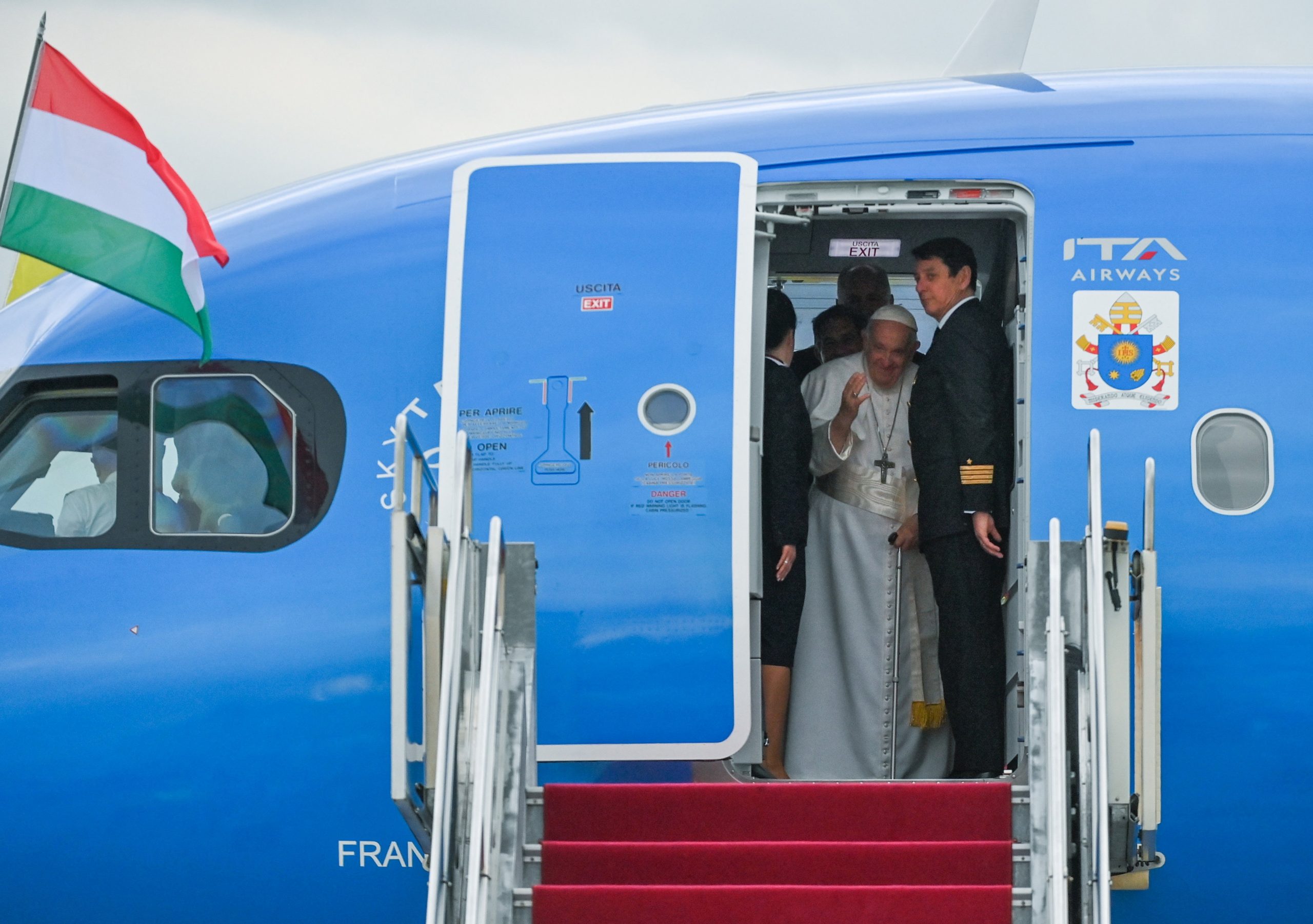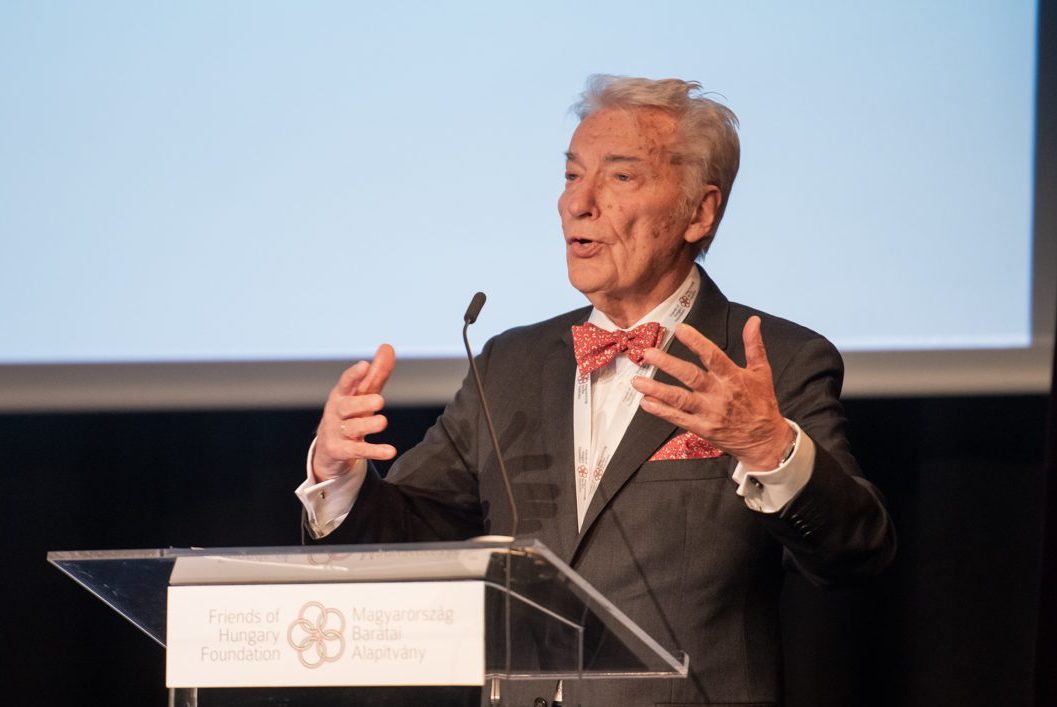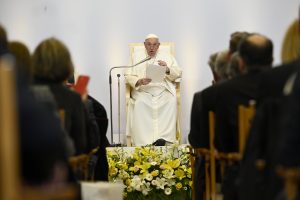
The head of the Catholic Church left Hungary shortly after 6pm.Continue reading

Radio Vatican interviewed E. Sylvester Vizi, renowned neurologists, former president of the Hungarian Academy of Sciences (MTA) and President of the Friends of Hungary Foundation (MOBA). He spoke about the message of the papal speech at the Faculty of Information Technology and Bionics of the Péter Pázmány Catholic University at the closing program of Pope Francis’ visit to Hungary.
During the interview, Vizi looked back on Pope Francis’ visit to Hungary, this time from the perspective of a scholar and researcher. As the final program of the three-day apostolic journey, the Holy Father met with representatives of the academic and cultural life of Hungary at the Faculty of Information Technology and Bionics of the Hungarian University of Technology. Among others, the event was attended by Professor E. Sylvester Vizi, who greeted the Pope personally and presented him with a gift.

Pope Francis during his address at the Péter Pázmány Catholic University. MTI/Kovács Tamás
The Hungarian professor shared his experiences of the visit with listeners of the Vatican Radio. He talked about his childhood, his church-school memories, his gift to the Pope and the message of the Pope’s speech at the Catholic University.
Professor Vizi’s first thought during the conversation was that it was a wonderful feeling to be Hungarian after the Pope’s visit. He himself went to church-school and one of the defining experiences of his childhood was the opportunity to serve in the Sacre Coeur Women’s Monastic Order in Budapest, the Sophianum and the nearby Christ the King Parish Church, as well as the Jesuit Church of the Sacred Heart of Jesus. He experienced the anti-clerical measures of the communist regime in the 1950s as a personal trauma and later, as a scholar, he saw clearly the serious damage that communism and the crimes against the Church had done to the fabric of Hungarian society. Nevertheless, he stresses that despite the ordeal, he witnessed personal achievements, among his fellow doctors. Pope Francis’ visit has now brought a new ray of hope and a renaissance of values to Hungarians not only in Hungary, and not only in the Carpathian Basin, but throughout the world. The professor sees this as the most significant achievement of this year’s papal visit.
He came here as a man who radiated love, and to quote St. Francis of Assisi, as much love as a man gives, the same amount remains in him.
When the Holy Father arrived in Hungary, the former President of the MTA and President of the Friends of Hungary Foundation, was keen to present him with a memento of his days in Hungary. He presented him with a three-volume book decorated with a national ribbon, the authors of which are Cardinal Péter Erdő, Chief Rabbi József Schweitzer and himself, E. Sylvester Vizi. The book is published in Hungarian, German and English, and is entitled Faith, Morality and Science. The volume was a great success in the United States. In Professor Vizi’s view the warm handshake between the Pope and himself at the presentation of the book was a sign of the Pope’s deep love for humanity, but also a recognition that the three values in the title of the volumes are not in conflict but complement each other and form an indissoluble whole.
The President of MOBA stressed that the Pope is aware that he has come to a country with more than a thousand years of Christian statehood, where the teachings of our King Stephen I. still live on.
The Hungarian people, despite the fact that we are a small country and a small nation, have contributed a great deal to the world’s cultural values, both in music and in the arts and sciences. Moreover, there are few other countries that have given so many saints and so many beatified persons to the Christian world as Hungary. As the Holy Father himself said during his stay here
I have come to the country of Saints,
reminded Professor Vizi.
In his speech at the Catholic University, Pope Francis stressed that while communism gave man nothing to consume, to acquire, to enjoy, today’s consumer society allows us to take so much for ourselves, but we must be careful not to lose man himself in the process. Because in the frenzy of consumption, we have no time to care for ourselves and our fellow human beings. Thus it is imperative to know ourselves and to know the people around us.
According to E. Sylvester Vizi, these thoughts also suggest that Pope Francis is the Pope of today’s man. He does not live in a world of isolated religious dogma, but is the Pope of the man in the street, who understands his everyday problems and seeks to give guidance in order to try to solve his life’s challenges without losing himself and his faith in himself and his fellow human beings.
It is not only Catholics, and Christians in general, who are addressed by the Catholic head of church, but also believers of all other religions and those who deny God. Hence, irrespective of religion or political stance, he wants to give direction to all people on this Earth, said the President of MOBA.
The Pope called science “molto importante” during his personal conversation with E. Sylvester Vizi, and the Hungarian scientist added that the possibilities and activities of science should not be limited, but the scientist himself should be aware that his work can only serve ethical purposes and should draw the attention of users to the fact that the unethical use of his discoveries and inventions can lead to tragedy. Professor Vizi gave the example of the atomic bomb, which Hungarian scientists had helped to develop. It is the responsibility of the legislator not to restrict scientific activity, but to regulate the use of scientific results in a reasonable way, and if necessary to limit it.
The former MTA President also pointed out that in our time, the development of science is growing exponentially, morality, however, does so only linearly. This has resulted in the historical tragedies of the 20th century: Hitler’s and Stalin’s crimes against humanity, but also terrorism. One could go on at length about the consequences of this though.
It is the task of thinking man to create a future worthy of man, which cannot do without morality based on the Ten Commandments of the Bible, religious faith that glorifies God and science that is fully aware of its ethical responsibilities, concluded his thoughts Professor Vizi.
Featured Image: Hungary Today